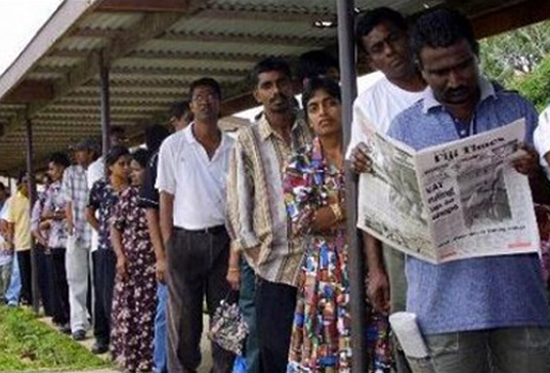
ANALYSIS: The state of Queensland has gone through an astonishing elections result last month: the Australian Labor Party (ALP) crashed from 49 seats out of 89, to a mere 7 seats.
The New Liberal Party (NLP) went up from 37 seats to a massive 78 seats.
Defeated Premier Anna Bligh gave a gracious concession speech, in which she said the "people have clearly spoken" and she congratulated Campbell Newman, the Leader of the NLP.
Similar gracious speeches were made by other losing ALP candidates, and the Greens and the Australian Party.
No political party complained that that the results were unfair or undemocratic in any way.
No losing candidate accused the winners of electoral fraud.
No international observer groups from the United Nations or European Union flew in to monitor the elections.
No international constitutional expert flew in to immediately advise that the constitution must be changed to ensure "democracy".
What an incredible contrast from Fiji. What can Fiji learn from Queensland?
But also, what might Queensland (and Fiji) learn from New Zealand, on the usefulness of electoral proportionality and the "List" system?
Electoral disproportionality
In the 2012 Queensland State elections, while the ALP won only 8 percent of the seats, it still retained 27 percent of the primary votes. On a proportional basis, it would have been entitled to 24 seats, instead of the 7 it did get.
The NLP won 50 percent of the primary votes, but 88 percent of the seats. On proportionality, it would have been entitled to only 45 seats, not the overwhelming 78 it actually has.
The other smaller parties had 16 percent of the primary votes, but only won 3 percent of the seats: They won only 3 seats while they might have been entitled to perhaps 20 seats, out of which perhaps 10 would have gone to the Australian Party and 6 to the Greens.
But not a single one of the small parties (and on the basis of the results, ALP has to be classified as a small party), complained about the "undemocratic" nature of the results.
In 1987, when the National Federation Party (NFP) and Fiji Labour Party (FLP) won the elections, and in 1999 when the FLP Coalition won the elections, they were immediately followed by military coups which removed them - it was alleged that "democracy was a foreign flower" which was not suitable for indigenous Fijians.
Fraud alleged
In 2001, when Qarase won the elections by a small margin, the Fiji Labour Party politicians alleged electoral fraud, although international observer groups found no great evidence of any.
In 2006, when the result was repeated, the same allegations were made with the additional one of ethnic minorities being unfairly marginalised.
Again, the international observer groups saw no evidence of any electoral fraud.
Indeed, there was no disproportionality at all against the Indo-Fijian ethnic minority, but small parties did lose out, as in the Queensland elections.
In Fiji, the military seized on these allegations of electoral fraud and did the 2006 coup.
But there has been no coup in Queensland, even though the disproportionality is miles greater here than in Fiji.
Rules accepted
The Australian parties all accepted the rules at the beginning of the game, and accepted the results, whichever way "the cookie crumbled".
Of course, ALP would be unlikely to complain because they were the beneficiaries in 2009, when the ALP had 42.3 percent of the primary votes, but a much larger 55 percent of the seats (49 seats); while NLP had almost the same percentage of the votes (41.6 percent) but a much smaller number of seats (37).
ALP saw no reason to change the system in 2009, and I doubt if the NLP would be fighting to change the system today.
But there are three good reasons why the Queensland system should be changed.
The current Queensland voting system converts small changes in the percentages of votes won or lost, into very large shifts in the percentage of seats won or lost, allowing the winning party to be unfairly dominant in Parliament, and the opposing parties emasculated way below their actual support in the state.
Virtually conceding defeat before the voting had even started, Anna Bligh pleaded with the voters not to give NLP overwhelming majority.
The second weakness is that small parties who can rarely get the 50 percent required in any one constituency, may have large aggregate support throughout the state.
The Queensland Parliament is therefore denied useful moderating forces which may represent "new social movements" (like the Greens or the Australian Party) which ought to be allowed to challenge the existing conservatism in Parliament.
The third weakness is that which caused a media frenzy: what if the NLP won the majority of seats and formed government, but Campbell Newman lost his bid in his constituency? This is easily possible if the winning candidate has a particular appeal in that one constituency out of the total 89 in the state.
Learning from NZ
Fiji is currently on the way to changing its electoral system as part of the military regime's "Yash Ghai Review" of the Constitution, leaning towards proportionality and a "list" element.
Queensland might wish to look at NZ's proportional list system.
This will not only ensure proper representation for all small parties in Parliament, but will also ensure that the party leader will be elected from the list, even if he/she is not elected in any particular constituency.
The list also ensures that parties' priorities in fair representation by gender, age, region or skills, is ensured by giving them adequate ranking at the top of the list.
The big question is: will Queensland be willing to learn from junior partner NZ?
Australian PM surprised by Labor rout in Queensland elections
This work is licensed under a Creative Commons Attribution-NonCommercial 3.0 New Zealand Licence.




